Are tomatoes harmful for kidneys?
Tomatoes are an incredibly popular fruit, and for good reason. They’re versatile, delicious, and packed with a variety of essential vitamins and minerals. But there’s some confusion about whether or not tomatoes can be bad for your kidneys.
If you or someone you love has kidney disease, it's important to know the answer to this question so that you can make informed dietary choices.
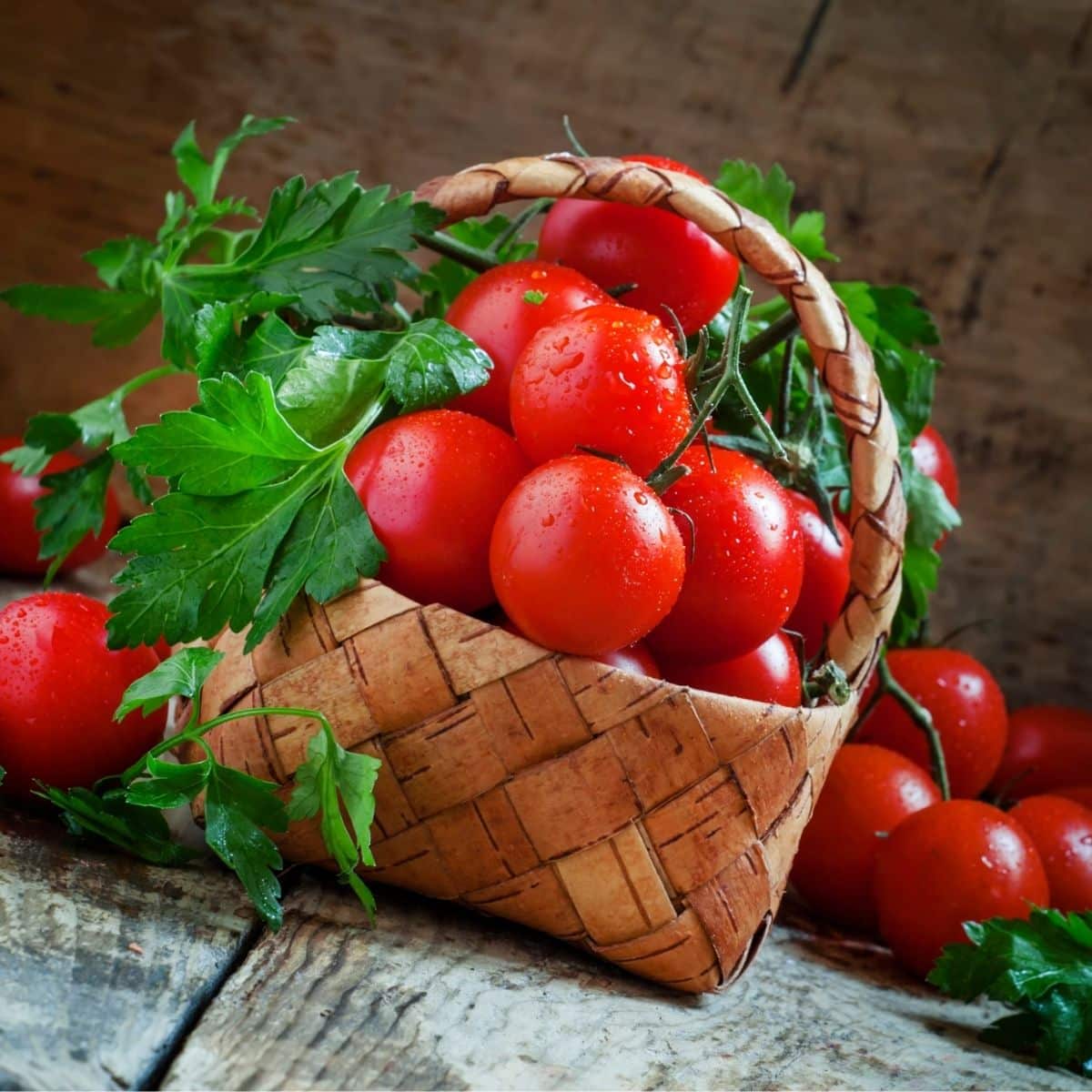
In this article, we’ll explore the potential risks that eating tomatoes may pose to your kidneys, as well as what kind of precautionary measures should be taken if they do prove harmful.
By understanding all sides of the issue, we can better protect our health (colon and kidney disease)—and ultimately serve ourselves and others in the process!
Jump to:
- Nutritional Benefits Of Tomatoes
- Vitamin C
- Lycopene
- Folate
- Nutritional Information Of Different Types Of Tomatoes
- Vitamin Content
- Mineral Content
- How Tomatoes Impact Kidneys
- Acidic Effects
- How To Reduce The Risk Of Kidney Damage
- Drink Plenty Of Water
- Eat A Balanced Diet
- Monitoring Kidney Health Regularly
- Alternatives To Tomatoes
- Comparison Of Heritage Tomatoes To Store Tomatoes
- Common Questions about Tomatoes
- Enjoy Tomatoes With Your Renal Plan
Nutritional Benefits Of Tomatoes
Tomatoes are a great source of Vitamin C, which is important for our immune system. They also contain a high level of lycopene, which has been linked to heart health.
Additionally, they are packed with folate, which helps the body make healthy red blood cells. Plus, they're high in fiber and low in calories, so they're a great snack.
You'll want to make sure you're following diet, feel free to reach out to a CKD nutrition coach.
For More Recipes and Ideas --->> Get Your Free Meals and Recipes That Are Perfect for Pre-Dialysis Diets, Pre-Dialysis with Diabetes, or Dialysis Diets.
Vitamin C
Tomatoes are one of the healthiest foods you can eat! Not only do they taste amazing, but they are packed with essential nutrients that your body needs. Vitamin C is a major nutrient found in tomatoes and has numerous benefits for our bodies.
Vitamin C is a crucial dietary source as it helps to protect cells from damage caused by free radicals. It also assists in digestion processes and can increase food chemistry absorption rates.
Studies have indicated that consuming enough vitamin C may reduce the risk of developing chronic kidney disease, which means tomatoes could play an important role in protecting against this condition.
Not only does eating tomatoes help promote better kidney health, but their high vitamin content also provides many other nutritional benefits. You can also check out this chronic kidney disease diet food list.
Lycopene
Another key nutrient found in tomatoes is lycopene, which can provide numerous health benefits. Lycopene has been linked to improved metabolism and dietary absorption rates, as well as increased bioavailability of other nutrients consumed with it.
Studies have also shown that consuming enough lycopene can help protect against atherosclerosis and other cardiovascular diseases and can even reduce the risk of cancer.
These impressive powers make lycopene an essential part of a healthy diet - so don't forget about this important nutrient when you're thinking about adding more tomatoes into your meals!
Plus, not only does it offer great nutritional value but its bright red color will add some extra pizzazz to any dish! So go ahead and enjoy all the amazing health benefits that come from eating tomatoes.
Folate
Now let's talk about folate! It's a key nutrient found in tomatoes and it plays an important role in keeping our bodies functioning properly.
One way folate is beneficial for kidney patients is by helping to break down the amino acid homocysteine, reducing its levels in the blood and lowering the risk of heart-related complications.
Another way folate is good for kidney patients is that they might suffer from anemia due to folate deficiency.
Folate is essential for the formation of red blood cells, and consuming adequate amounts can help prevent or alleviate anemia in kidney patients. Lastly, folate is crucial for the proper functioning of the nervous system.
Kidney patients may experience nerve damage due to the accumulation of toxins in the blood. Consuming sufficient folate can help maintain nerve health and reduce the risk of nerve-related complications.
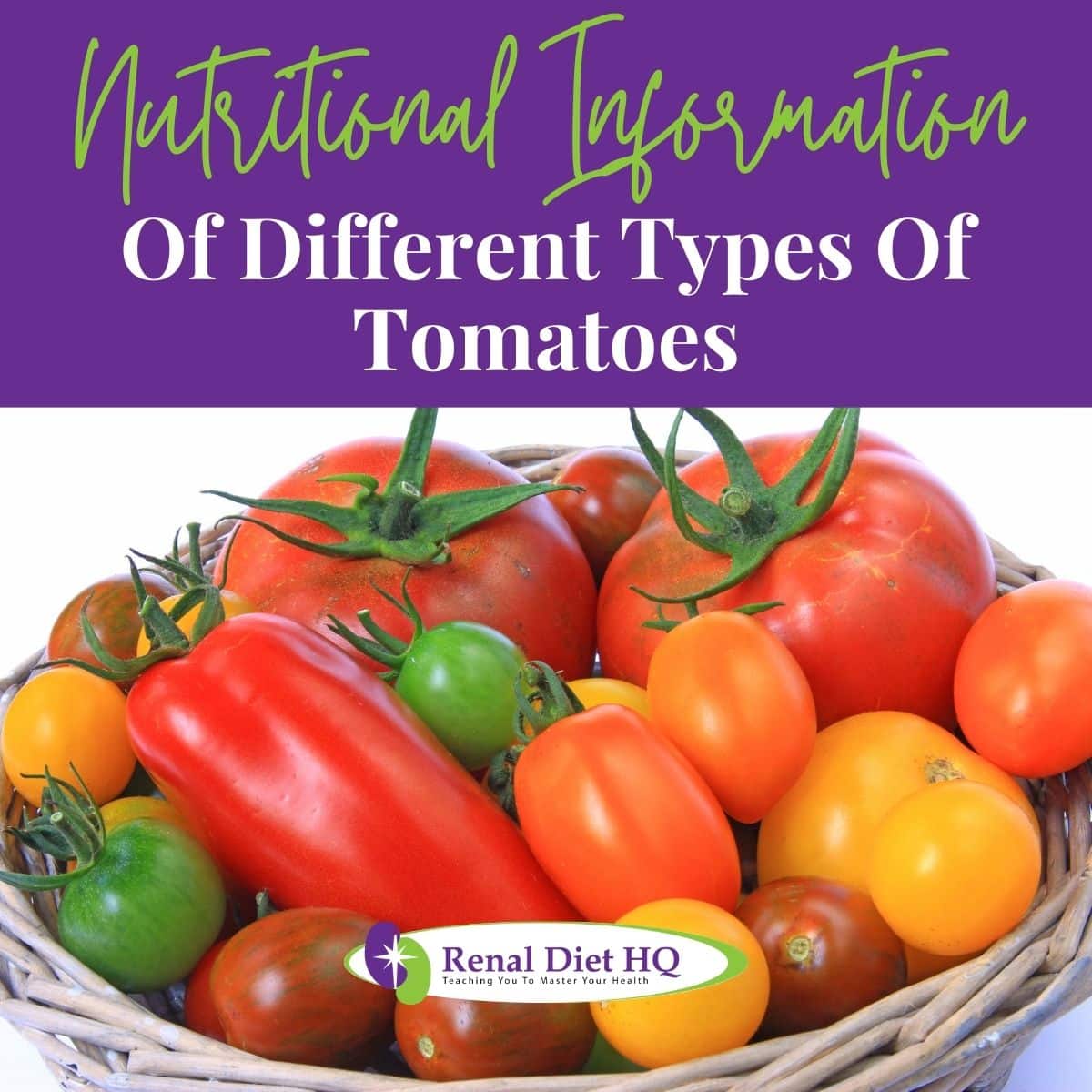
Nutritional Information Of Different Types Of Tomatoes
Up next, we'll cover the vitamin content, mineral content, fiber content, lycopene content, carotenoid content, calories, fat, protein, carbohydrates, sodium, potassium, calcium, iron, magnesium, and phosphorus.
Then we will cover the most important differences in these components between the different types of tomatoes. Let's get started! There are also lots of other vegetables low in phosphorus and potassium.
Vitamin Content
It's hard to deny the health benefits of tomatoes! Packed with essential vitamins and minerals, they are a great addition to any meal. But what about their vitamin content?
Tomatoes are a great source of vitamins and minerals, including vitamin C, vitamin K, potassium, and folate.
Here is a breakdown of the vitamin content of one medium-sized tomato (approximately 123 grams):
- Vitamin C: 16.0 mg (18% of the Daily Value)
- Vitamin K: 14.2 mcg (12% of the Daily Value)
- Folate: 15.4 mcg (4% of Daily Value)
- Vitamin A: 1025 IU (21% of the Daily Value)
Tomatoes also contain small amounts of other vitamins, such as vitamin E, thiamin, riboflavin, niacin, and vitamin B6.
Additionally, tomatoes are a rich source of antioxidants, such as lycopene, which has been linked to various health benefits, including a reduced risk of certain types of cancer.
It's worth noting that the vitamin content of tomatoes can vary depending on factors such as the variety of tomato, ripeness, and growing conditions. For example, cherry tomatoes contain higher concentrations of Vitamin C than regular or beefsteak varieties.
If you're looking for help on creating meals, give this 7 day meal plan for kidney disease a try!
Mineral Content
One of the functions of the kidneys is to rid the body of excess waste, including excess minerals that the body produces naturally. Two of these minerals are potassium and sodium.
Potassium is necessary for the body to function normally. Low potassium levels can cause weakness, fatigue, cramping, irregular heartbeat, and even heart failure.
While low potassium levels can hurt the body, so too can high levels. When the kidneys do not function properly, excess potassium builds up in the body instead of being flushed out. High levels of potassium can lead to nausea, weakness, irregular heartbeat, heart failure, and in extreme cases- sudden death.
Tomatoes are a high potassium food. If you are on a potassium restricted diet, it is not recommended that you risk it.
When on a renal diet, keeping careful track of your sodium intake (renal diet sodium limit) is especially important. The recommended daily limit of sodium for kidney patients is generally 1,500 mgs of sodium per day.
However, depending on your specific case, your doctor has probably recommended half or less of the recommended dose for healthy individuals.
When asking if tomatoes are harmful for kidneys, something to remember is the sodium content of one small, raw tomato is a slight 6mg. However, the sodium content for canned tomato products can be very high. Limit canned tomatoes in any form- sauce, stewed, etc.
How Tomatoes Impact Kidneys
Tomatoes are a great source of nutrients, but they can also have an impact on our kidneys. Their nutrient content is good for overall health, but the high potassium and the acidic effects of tomatoes can also be an issue for those with kidney problems.
Thus, it's important to be aware of the potential risks that come with eating tomatoes for those with kidney issues.
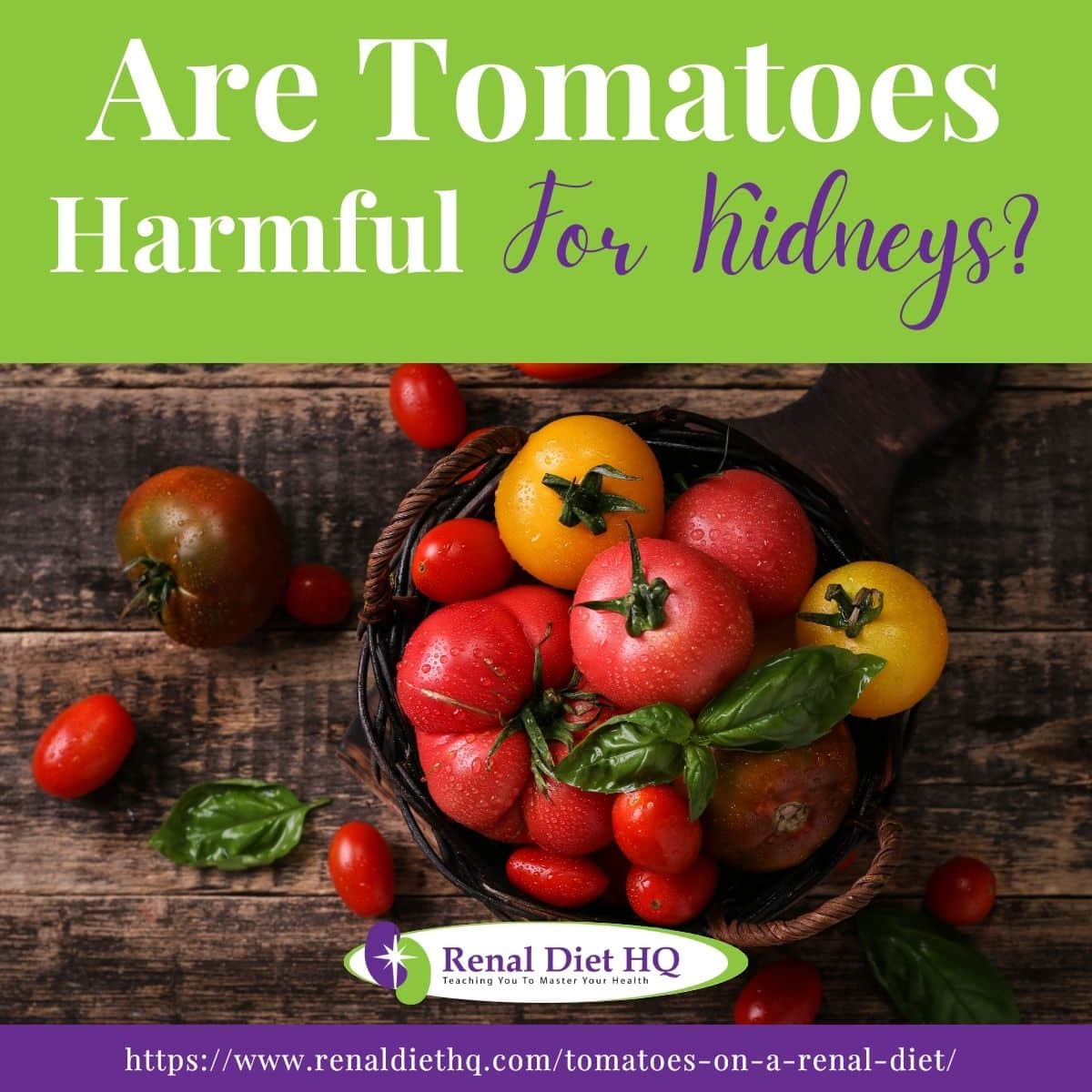
Acidic Effects
When it comes to dietary management and kidney health, the acidity levels of our food choices are also important. When consumed in excess, tomatoes contain high levels of acidity which could lead to a disruption in the balance of your diet if not managed properly.
Farming techniques can have an effect on the acidity levels of tomatoes, as different soil chemistry affects their taste. Generally, tomatoes with a higher sugar content tend to be less acidic, while those with a lower sugar content tend to be more acidic.
Eating a variety of foods is key – so make sure you include other sources of nutrition such as vegetables, grains, and fruits for overall support of your kidneys.
How To Reduce The Risk Of Kidney Damage
First, let's talk about drinking plenty of water. Staying hydrated is essential to maintaining healthy kidneys, so it's important to make sure you're getting enough water each day. Next, let's discuss eating a balanced diet.
Eating a variety of fruits, vegetables, proteins, and complex carbohydrates can help reduce the risk of kidney damage. In particular, reducing sodium and limiting processed foods (processed foods and CKD) can help keep the kidneys healthy.
Lastly, let's talk about tomatoes and whether they are bad for the kidneys. While tomatoes are generally a healthy food, if you have kidney damage, it is important to limit your intake of high potassium foods like tomatoes.
Drink Plenty Of Water
We all know the importance of staying hydrated - it's essential to our health. But when it comes to kidney health, proper hydration may be even more important than you realize. By drinking plenty of water and making sure your food choices support a healthy lifestyle, you can reduce your risk of damage to these vital organs.
What does this look like in practice? Well, that depends on many factors such as age, activity level and overall health. Generally speaking though, an adequate daily intake is somewhere between 6-8 glasses of water or other fluids per day – not just soda! Take advantage of kidney friendly drinks.
Taking extra steps like avoiding smoking and limiting alcohol consumption can further protect your kidneys from harm. And if you’re particularly concerned about how you might be affecting their health, consider talking with your doctor about what changes you could make to ensure lifelong wellbeing.
Eat A Balanced Diet
To further reduce the risk of kidney damage, it's important to eat a balanced diet. That means cooking with methods that promote food safety and understanding proper portion control.
Eating plenty of fruits and vegetables is key for ensuring good overall health, but also provides vitamins A & C which are essential for protecting your kidneys from harm.
When in doubt, seeking dietary advice from a healthcare professional can help you make sure you’re making healthy choices that support long-term kidney health.
So don't be afraid to ask questions if something doesn't seem right – after all, knowledge truly is power when it comes to taking care of yourself!
Monitoring Kidney Health Regularly
Being mindful of your eating patterns and keeping an eye on your kidney function can be key to making sure the dietary changes you make are beneficial.
Regular monitoring is especially important for those with existing or pre-existing conditions such as high blood pressure, diabetes, or kidney disease.
It's also essential if you're looking to increase your tomato consumption gradually – something that could potentially improve overall kidney health. By gaining a better understanding of how food affects us in terms of our lifestyle choices and habits, we can empower ourselves to make better decisions for our wellbeing.
In other words, being aware of what we eat and when helps ensure that any dietary changes we make will have positive results!
Alternatives To Tomatoes
When it comes to protecting your kidneys, dietary substitutes are key. If you’re worried about tomatoes being bad for your kidneys, consider exploring other vegetables in the same family with lower levels of preservative content.
There are plenty of kidney friendly recipes that don't include any tomato - from zucchini bisque to eggplant Parmesan and everything in between!
If you're looking for dishes without tomatoes but still want something flavorful, explore a variety of vegetable selection. From hearty root vegetables like carrots and potatoes to leafy greens like lettuce and cabbage (cabbage recipes for kidney patients).
There's no shortage of options when it comes to creating delicious meals sans tomatoes. Not only will these replacements give you an array of flavors, they'll also offer additional nutritional benefits too!
For those who enjoy cooking their own meals or ordering takeout, remember that even small changes can make a big impact on kidney health.
Whether you opt for tomato-free salads or switch out marinara sauce for pesto instead, every meal is an opportunity to create healthier habits while enjoying great taste at the same time.
Comparison Of Heritage Tomatoes To Store Tomatoes
Trying to understand renal diet tomatoes? For kidney patients, there is no significant difference between heritage and store-bought tomatoes in terms of their nutritional value or impact on kidney health. However, there are some differences between the two types of tomatoes that may be of interest.
As long as you eat them in moderation, heritage and store-bought tomatoes are good sources of vitamins, minerals, and antioxidants. However, some studies suggest that heritage tomatoes may have higher levels of certain nutrients, such as lycopene, than store-bought tomatoes.
Common Questions about Tomatoes
Yes, it is true that tomatoes are relatively high in potassium, which can be a concern for kidney patients.
Potassium is an essential mineral that helps regulate fluid balance, nerve function, and muscle contractions in the body. However, for people with kidney disease, high levels of potassium in the blood can be dangerous and can lead to serious health complications.
A medium-sized tomato contains about 290 mg of potassium, which is considered a moderate amount. For most people, this is not a problem, but for those with kidney disease, it may be necessary to limit potassium intake.
It is important for kidney patients to work with a healthcare provider or registered dietitian to determine the appropriate amount of potassium to consume based on individual dietary needs and health status.
Tomatoes are a great source of vitamins and minerals, but their high acidity levels can be a cause for concern.
Combining tomatoes with other foods such as onions or bell peppers can help balance out the acidity levels and enhance flavor profiles.
Ultimately, it's important to remember that eating tomatoes in moderation comes with many health benefits without any additional risks.
There are no specific types of tomatoes that are more beneficial for people with kidney issues. But, it is important to consider the preparation method of tomatoes.
Raw tomatoes are generally higher in potassium than cooked tomatoes, so cooking tomatoes can help reduce their potassium content. Additionally, removing the skin and seeds of tomatoes can also help reduce their potassium content.
It is important for kidney patients to work with a healthcare provider or registered dietitian to determine the appropriate amount of tomatoes to consume based on individual dietary needs and health status.
For kidney patients, tomato juice can be a source of concern due to its relatively high sodium and potassium content.
A cup of tomato juice contains about 560 mg of potassium, which is considered a high amount. For people with kidney disease, high levels of potassium in the blood can be dangerous and can lead to serious health complications.
There are ways to reduce the potassium content of tomato juice, such as by diluting it with water or using low-potassium tomato juice. However, it is important to note that diluting tomato juice can also reduce its nutrient content, so it is important to balance the benefits and drawbacks of different preparation methods.
If you need to know about facts about Chronic Kidney Disease, then it's important to read up on it as much as possible.
Enjoy Tomatoes With Your Renal Plan
Tomatoes can be a healthy and nutritious addition to a renal diet as long as you eat them in moderation. They are a great source of vitamins and minerals, including vitamin C, vitamin K, and folate. Monitoring portion sizes can help manage potassium levels and support kidney health.
Can you eat tomato sauce with kidney disease? When incorporating tomatoes into a renal diet, it's important to avoid using high-potassium ingredients like tomato sauce or tomato paste, and to opt for fresh tomatoes or canned tomatoes with no added salt.
As with any dietary changes, it's important to consult with a healthcare professional or registered dietitian to ensure that the chosen foods and preparation methods are appropriate for the individual's specific dietary needs.





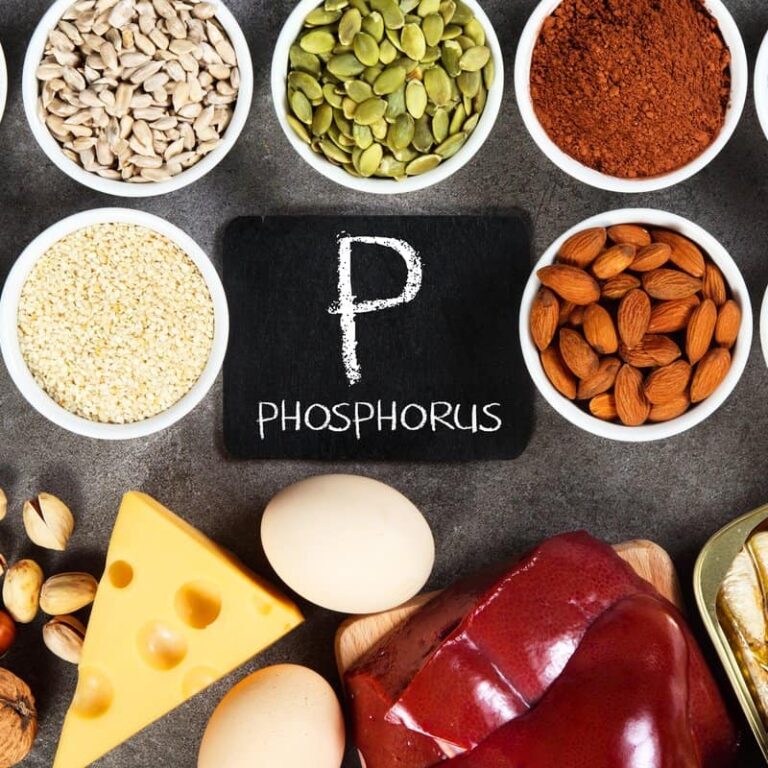


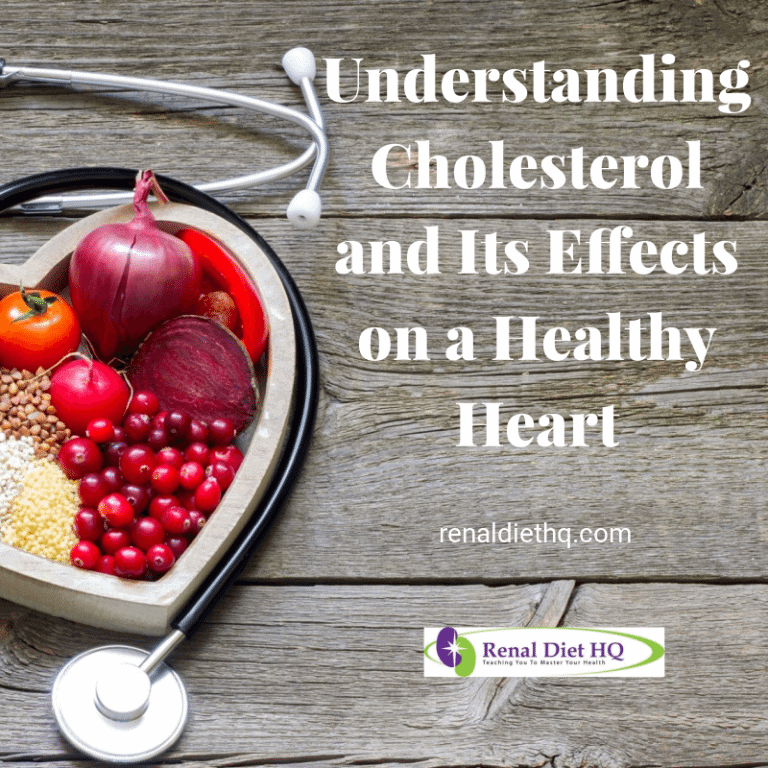
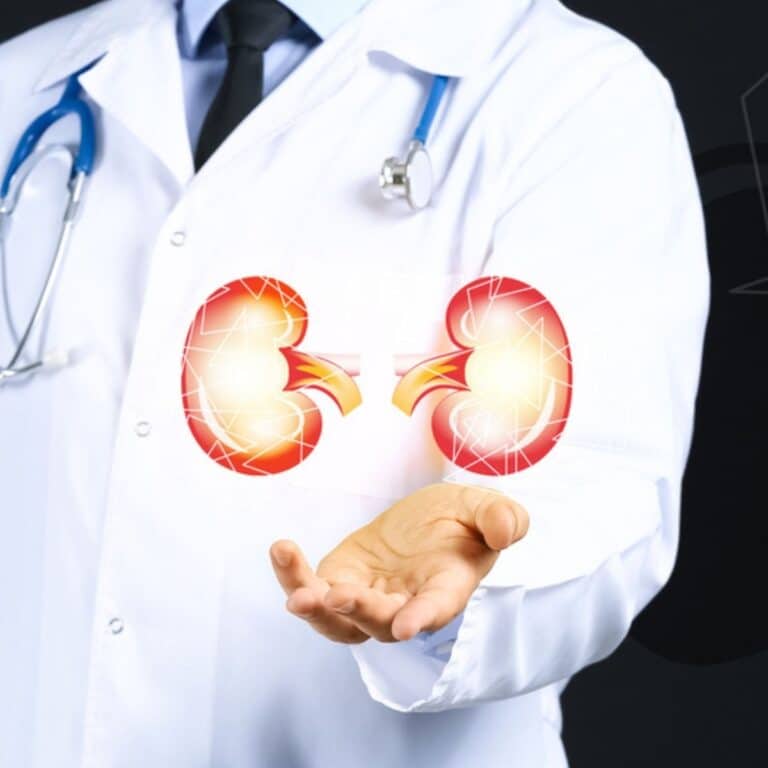

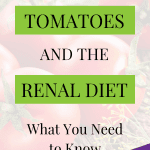

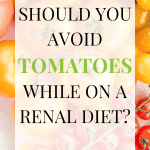
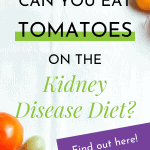
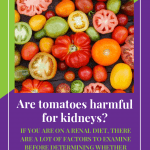
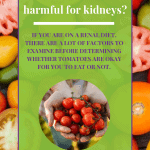
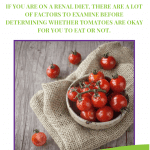




What can be used as a substitute in place of tomatoes in dishes that call for it? I crave spaghetti, enchiladas, pizza. Appriciate any help.
I tried to click on "MEDIUM" to browse and its reading was no longer up....Is this a book? My husband 40yr old hispanic is in his 2nd yr of double kidney disease 6% functioning. No ins so no surgery....Im looking for LOTS OF FOOD HELP and INFO. Our meals a consistently the same....BORING....lol. Any info greatly appriciated. Thank you